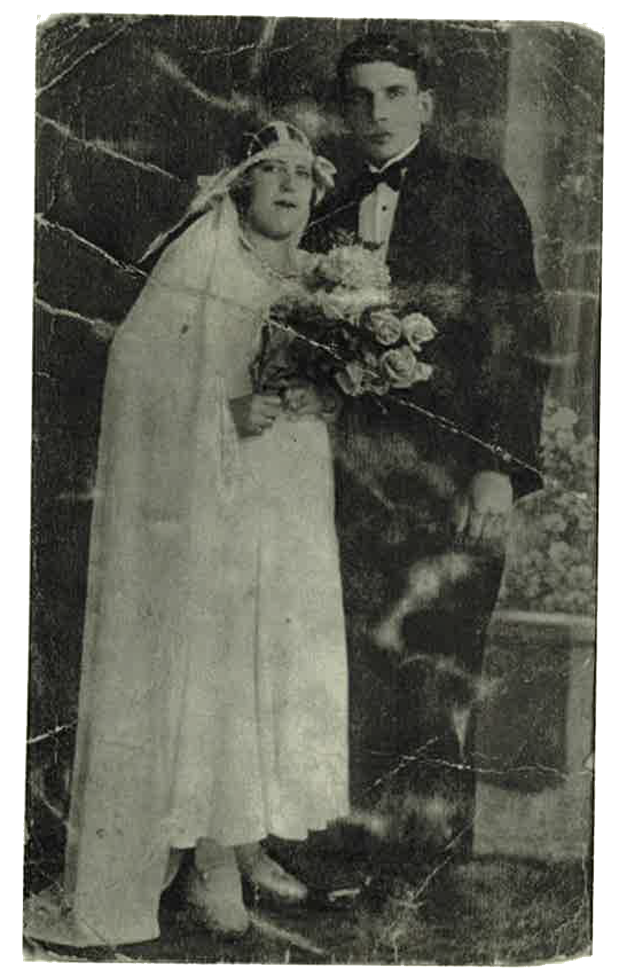There was a secret ingredient in my grandmother's borscht. It was called survival.
My grandparents, Leah and Duvid, relished the borscht at their kitchen table. They kindly slid a bowl of the beet red soup toward me. It’s an acquired taste, I rationalized. My stare and a dollop of sour cream didn’t improve the raw earthy taste. Why was this a staple of their diet? Then I recalled a different time in their lives, but not so long ago.
The early days of their marriage and raising a family in 1939 Warsaw was unimaginably brutal. On the day my grandmother went into labor with her second child, the Germans bombed the city and leveled the hospital. Trapped in the Warsaw ghetto, food was initially sparse then nonexistent. Her efforts to nurse an infant magnified their desperation. Surviving the next year and eventually escaping the Warsaw Ghetto through hand-dug tunnels was miraculous. Hiding from the Gestapo in the winter forests of eastern Europe exacerbated their gut-churning hunger.
My father, Sam, was 8 years old at the time of their escape. He sparked hope. From the edge of the woods, they occasionally spied a frozen and snowless farm field. Young Sam went to work. At the first crack of sun and before anyone woke in the farmhouse, he sprinted into the field with inspired energy.
He ran toward any green stem, left standing in the soil from the fall harvest. It meant life. His frozen fingers and nails scraped at the icy dirt, revealing an ignored food bit. Maybe it was a neglected and half-rotted potato, turnip or a beet. A raw morsel of a dirt-crusted beet was a treat to be shared with his concealed family. Surviving the harsh winter of January 1941 was visceral and not guaranteed. It was impossible to plan a future beyond the end of the day.

***
In 1973, my family gathered for our first Passover after my Bar Mitzvah. I normally focused on the broken middle matza and reciting the Four Questions. That year, the lessons from the Exodus felt different. While my grandparents never talked about surviving and escaping the Warsaw Ghetto, my father had begun to privately share some of the horrid details with me.
As my grandfather chanted the Hebrew from the Haggadah, my father read the English translation with his thick Yiddish accent. He turned toward me, my younger sister, Lainie, and older brother, Bruce. Reading from a page in the Haggadah, my father explained the clear instruction. “We must remember and act as if we were the liberated slaves from Egypt,” he said. While I understood the path of the Jewish people, slavery under Pharoah was difficult to personally comprehend, even watching Charlton Heston.
My grandmother’s over-crowded Seder table had room for the borscht. Now I understood. It clicked like a well-fitted puzzle piece, always in plain view. There was much to learn from the silent red soup. For me, Passover was more than commemorating the Exodus. It was engaging what is directly in front of you and grasping how fortunate we are to be here. It was personal.
And we must remember. Whoever published your copy of the Haggadah, it speaks of how as Jews we should recall a liberation. While it occurred thousands of years ago, we are charged to remember it as if we were there. Meanwhile, we don’t have to go that far back in time to remember those survivors who have been and still are members in our present Jewish community. Maybe someone in your own family.
That night the words of the Haggadah, being read by family survivors of the Shoah, swirled in my head. It led me to one conclusion, regarding our pledge to remember the Exodus. We should also recall the Shoah with the same reverence, as if we survived a Nazi-controlled ghetto or concentration camp. Remember it as if you were there.
For us, the borscht at our Passover Seder was as significant to our family’s existence as the matza. My grandmother’s unnamed ingredient in the soup was survival.
My grandparents and father have passed, but their life examples during and after the Shoah remain and are treasured. They taught me that life is richer when you embrace the source of your resilience. Remember it and pass it on. Don’t waste the temporary opportunity of now.
Jeffrey N. Gingold is the author of "Tunnel, Smuggle, Collect: A Holocaust Boy," (Henschel Haus, 2015). The United Nations Holocaust Memorial Ceremony marking the 2022 International Day of Commemoration in memory of the victims of the Holocaust will be Thursday, Jan. 27.
Our subscribers make this reporting possible. Please consider supporting local journalism by subscribing to the Journal Sentinel at jsonline.com/deal.
DOWNLOAD THE APP: Get the latest news, sports and more
This article originally appeared on Milwaukee Journal Sentinel: There was a secret ingredient in my grandmother's borscht: Survival.
